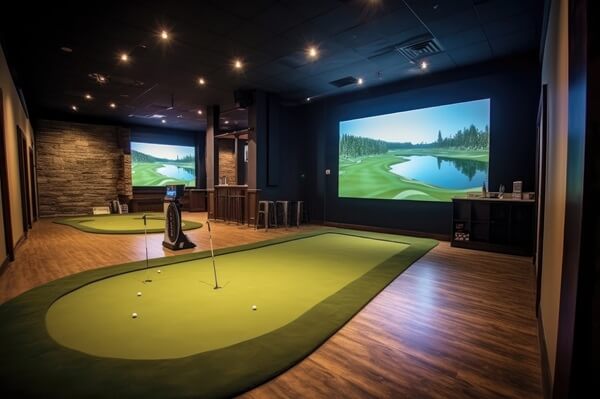Indoor Golfing Revolution: A Guide To Latest Golf Simulators

Golf has long been an outdoor sport played on vast, green courses. However, a recent shift is bringing the game indoors through the use of golf simulators. These devices are transforming the traditional golfing experience with remarkable realism.
Golf simulators combine sports and advanced technology, offering more than just a recreational activity. As they continue to evolve, they open up a new dimension of the sport.
This guide will explore the sophisticated technology behind these simulators, revealing how they revolutionize the way golf is played and experienced.
Origins And Early Development Of Golf Simulators
Golf simulators began as basic tools, far from today’s cutting-edge models. Their initial versions offered simplistic graphics and minimal feedback, functioning more as novelty items than true golf aids. This early stage laid the foundation for future technological enhancements.
These primitive simulators slowly evolved, integrating better technology over time. Early improvements focused on enhancing visual feedback and basic swing analysis. This period marked the start of a progression towards more realistic golf simulation systems.
Cutting-Edge Technologies In Modern Golf Simulators
Modern golf simulators are a fusion of advanced technologies, each contributing to a highly immersive and accurate golfing experience. These indoor golf simulation solutions are equipped with the following key technological elements:
- High-Definition Graphics And 3D Modeling: Utilizing graphics engines, modern simulators provide a visually immersive experience that mimics real-world golf courses. Through 3D modeling, they replicate course environments with remarkable detail, enhancing the player’s visual and playing experience.
- Advanced Ball Tracking Technologies: Modern golf simulators rely on innovative ball tracking technologies for accuracy. Photometric systems use high-speed cameras to analyze the ball’s speed, spin, and trajectory, offering detailed shot data. On the other hand, radar-based systems employ Doppler radar for comprehensive flight path metrics, capturing speed, angle, and distance.
- Swing Analysis Tools: Incorporating sophisticated sensors and analysis software, simulators offer detailed insights into the player’s swing. These tools evaluate aspects like club speed, attack angle, and the club’s path, providing actionable feedback for skill improvement.
- Artificial Intelligence (AI) And Machine Learning: AI and machine learning are increasingly leveraged to personalize the golfing experience. These technologies offer custom coaching tips, adjust simulations to the player’s skill level, and analyze shot outcomes based on data patterns.
These technologies collectively elevate modern golf simulators beyond mere entertainment devices to innovative tools for enhancing gameplay and skill development. They represent a significant leap in how golf is experienced, blending the physical and digital worlds to offer a comprehensive and engaging approach to the sport.
Virtual Reality And Immersive Experience
Virtual reality (VR) in golf simulators adds a new layer of immersion to the game. By wearing VR headsets, players are transported into a lifelike virtual environment, where every aspect of the course and conditions is vividly replicated. This technology not only enhances the visual experience but also improves spatial awareness and shot planning.
Augmented reality (AR) takes a different approach, overlaying digital information onto the real world. In simulators, AR can provide interactive tutorials, shot guides, and real-time feedback, making the learning process more engaging and effective.
Precision And Accuracy In Modern Simulators
The precision and accuracy of modern golf simulators are central to their appeal. Advanced sensors and analytic tools capture and interpret every nuance of a player’s swing and the ball’s trajectory. This data is used to provide incredibly accurate simulations of ball flight and landing, closely mirroring real-world physics.
Accuracy in simulators not only improves the player’s experience but also becomes a valuable tool for skill development. By offering precise feedback on every shot, these simulators help players understand and improve their techniques more effectively.
Customization And Interactivity
Customization is a key feature of modern golf simulators, allowing players to tailor their experience to their preferences. Users can adjust variables like weather conditions, time of day, and course settings, creating unique challenges and experiences. This level of customization ensures that the simulator remains engaging and relevant to a wide range of players.
Interactivity extends to multiplayer options and online competitions, fostering a social aspect to the simulator experience. Players can compete with others around the world, share their progress, and even participate in virtual tournaments, adding a competitive edge to their practice sessions.
Final Thoughts
Golf simulators have undergone a remarkable transformation driven by rapid advancements in technology. From high-definition graphics and precise ball tracking systems to immersive VR experiences, these simulators offer a blend of realism and innovation. They’ve redefined how golf is played and experienced, making the sport more accessible and engaging than ever.
As they continue to evolve, they promise to bring new levels of enjoyment and improvement to players around the world. In embracing these advancements, golf enthusiasts are not just witnessing a change in the game, but actively participating in a new era of golfing experience.
